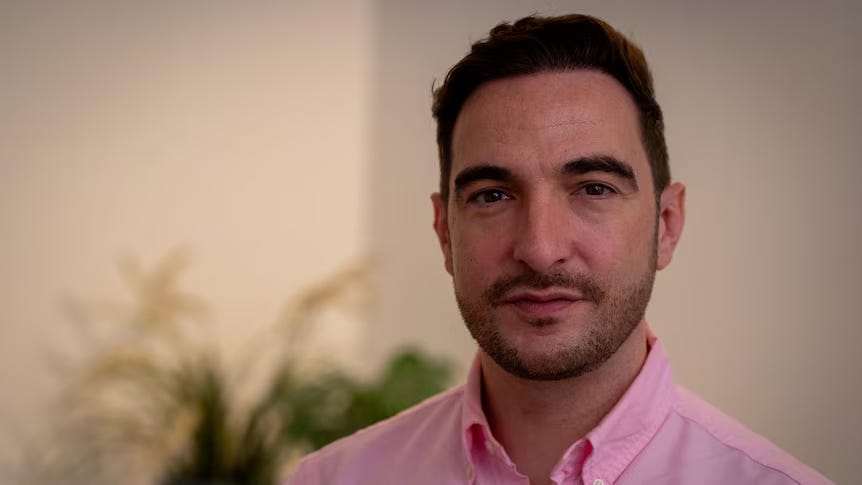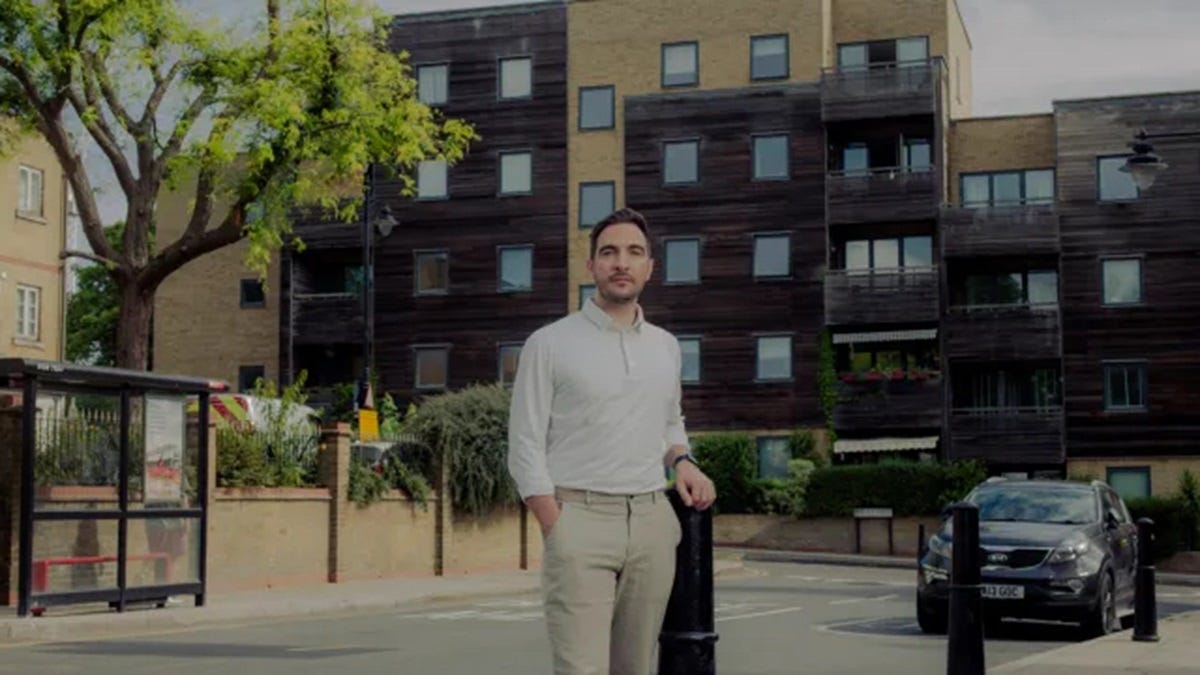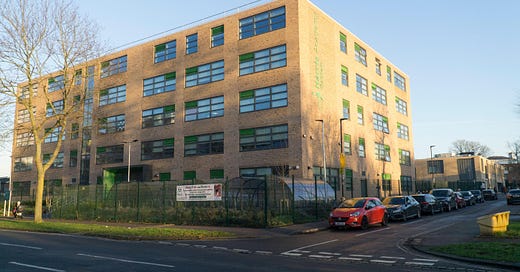
Toxic assets: Housing association homes and shared ownership
Leasehold concerns, sky-high service charges and strict sell-on rules. Inside the people becoming trapped from moving on and losing money after buying a shared ownership home.
Five years ago postman Robert Carver, 36, thought he was making the best investment in his future possible: getting his first step on the property ladder. He bought a 40 per cent share of a new-build flat in Chichester through a large housing association and believed that he was setting himself up for life.
But in your early thirties life moves fast. By 2022 he had a partner and a baby on the way. He put the flat up for sale and managed to find a buyer for his share through the housing association, Hyde Housing, very quickly, but due to strict new building safety requirements the buyer couldn’t find a lender willing to offer her a mortgage on the property - even the bank that Carver was already borrowing with - and she pulled out.
Three years later, Carver has an 18-month-old son and the property has dropped in value. He and his family are living in rented accommodation while renting out the flat because he still cannot find a buyer. “It’s gone from being sold straight away to being stuck. I tried again last summer but there was no interest,” he says.
The market price for flats, particularly in London and the south-east of England, has flatlined in recent years and the debate over leasehold and sky-high services charges is also putting buyers off. And for shared owners there is another crucial issue. Strict rules on sale are tied into the shared ownership agreement. When a property is sold onwards a valuation must be sought by a RICS-accredited property consultant. If the owner decides to sell for less than that price, the shared owner is forced to take all the risk and absorb the difference in value from their share of the profits.
Carver’s latest RICS assessment has dropped by £40,000 since his first attempt at sale, but he says the actual market value of the property is even lower than that. He fears if he sells now he will end up paying the housing association for his losses. But if he holds onto it, the running costs - including rising services charges - could rapidly bankrupt him. “I’m relying on someone else covering the rent and mortgage, and if they were to keep going up it would be really difficult. I would be really struggling to get by. I never planned to be a landlord or make any money out of it,” he says.
Now Carver says his family would be better off if he’d carried on renting rather than putting a foot on the first rung of the property ladder. He has even considered just handing his hard-won share back to the bank. “I’ve considered just completely washing my hands of it and deferring on payment and just moving out,” he says. “I feel like sometimes that would just make my life a lot easier.”
Conveyancing solicitor Zarah Aullybocus, who specialises in shared ownership, says this is a common complication. Many shared owners she works with did not fully understand the requirement to sell on at a price agreed by the housing association when they first bought into the product. The general acceptance of the last three decades that house prices always rise - which, since the pandemic, is no longer the case for flats without outside space - has fuelled this misunderstanding.
Many housing associations also insist that the seller uses the valuer that they have appointed, meaning that the valuation isn’t entirely independent. “The housing association might be helpful by providing somebody but at the end of the day if that valuer is reliant on work from the housing association, they’re going to do what the housing association tells them to do. There’s bias there,” Aullybocus says. Shared owners can instruct a second valuation, but that costs more money on top of the already higher-than-average conveyancing fees for buying or selling shared ownership, due to the legal complexity of the arrangement.
She believes that housing associations should not be sticking to a RICS valuations whatever the outcome of a sale process. “They need to basically work with the fact that the market value is what somebody is willing to pay for the property,” she says.
But though Labour intends to make minor amendments to the shared ownership agreement as it updates leasehold law, this aspect of the deal is unlikely to change.
“It’s probably the most expensive small one-bed flat in north west London.”
Darren Welch, 42, is facing a similar conundrum. He now lives in Derbyshire but holds a stake in a shared ownership flat in the capital that he cannot sell.
He first made his request to the housing association, Notting Hill Genesis, to sell in 2020, but had to wait for building safety forms to be approved after the change in law implemented in the aftermath of the Grenfell Tower. “There was delay after delay. The work was complete and scaffolding removed earlier this year but no sooner had it finally become an attractive property to potential buyers they went and increased my service charge by 121%,” he says. “It’s probably the most expensive small one-bed flat in north west London.”
As prices have steadied or dropped, service charges have increased rapidly due to the rising of building insurance. Despite only owning a minority stake in the property and renting the rest, shared owners are responsible for all maintenance and running costs including the full service charge on the property.
Welch has now received an estimate for next year’s bill with another hike of almost 80%. He says he is now paying 792% more than when he first bought the property in 2012 - making it almost impossible to sell, and reducing the value on the market. He has been granted the right to rent it out, but he wants rid.
What’s worse, Welch says, is that he simply didn’t realise before purchase that this scenario could arise. He says the small print involved in shared ownership - including the risk of handing back some of your profit if you are forced to sell for less than the RICS value of the property - is not fully explained at the point of purchase.
“I feel there’s a lot of information they don’t give you, or they give it to you but then it’s not explained to you,” he says. “It has been on the market for a few years now. I've dropped the price a few times to where it's now £60k less and a lot cheaper than equivalent flats to make up for the astronomical service charge. Even if I did manage to sell at that price, I would then have to pay back any shortfall the housing association made from the RICS valuation.”
Meanwhile, Welch is stuck: “I've complained, I've offered the flat back. I've emailed the CEO. But no one cares. I would literally give it away if I could, but that's not even an option. I feel like the only way I can get rid of it is to sell it to an investor £100k under the current price and pay out of my pocket to the housing association for their loss,” he says.
“People are so desperate for a roof over their heads that they do it even though I tell them it’s going to cost them longer term.”
Despite the difficulties in selling onwards, shared ownership is booming. There were 20,517 new shared ownership homes registered in 2022-23, the highest number since 2009-10. Although building on 13,500 new shared homes started in the same year, that drop corresponds to the similar dip in social housing development, due to a funding retrenchment under the Conservative government (shared ownership properties are built and co-owned by housing associations).
With the rapid expansion in housebuilding, including social housing, commenced by the new Labour government it is highly likely that number will rise again. With more government money invested directly in social housing there may be less necessity for housing associations to rely on cross subsidy from private part-sales, but the product still makes money for them.
Crucially, despite the clear financial risks, the demand is still there. Satisfaction figures for shared ownership shows that frustration with the product is not affecting prospective buyers, only those already further down the line. “At the point of purchase residents are euphoric,” says Alistair McIntosh, chief executive of the Housing Quality Network and an advisor to social housing providers. “It’s further down the line, when service charges come in and interest rates affect them that it changes. Everyone under the sun wants low cost home ownership.”
Geographically, shared owners in London and south-east are least satisfied with their deals. That’s because the majority of these homes in the south are flats, where the issue of dropping market value and rising service charge costs have been most severely felt. Those who have taken out a shared ownership deal on a house are happier with the product.
McIntosh says that, in their desperation, potential buyers are not listening to risks they are taking when they sign up to a shared ownership deal - and Aullybocus agrees. “People are so desperate for a roof over their heads that they do it even though I tell them it’s going to cost them longer term.”
The short three-month timescale stipulated between valuation of the property and completion of a purchase, required by most shared ownership leases, means both buyer and seller often take decisions in a state of “panic”, she says. “If you’ve agreed a sale in February and you’ve only got until the end of April to complete, that’s just not realistic.
With odds stacked against the seller, deals often fall apart at the last minute or take years to reach completion.
Paul Afshar, 41, sold his shared ownership flat at the end of 2024 after a painful, 18 month process.
He could not find a buyer for his 25 per cent share so was forced to sell the flat at 100 per cent of the value. That meant he had to go through a nail biting completion day in which he raised finance to buy out the remaining 75 per cent share of the property from the housing association, Southern Housing, and then immediately sold it on, along with his original 25 per cent stake - all on the same day.
Despite being located in Hackney, east London, Afshar found buyers had limited interest in his one-bedroomed property. “When I initially put it on the market four years ago, it was valued at £325,000. A year ago it was valued at £300,000. In total, over a period about two months, there were three viewings - only one of them made an offer. There was only one offer so I was prepared to stick with it for a whole year because it’s so hard for other interested parties to get an agreement from a mortgage lender.”

Afshar, who first bought the property 17 years ago and had paid off the majority of his mortgage, did receive approximately £50,000 from the eventual sale, but was frustrated to find that all the costs of selling also fell to him even though the housing association pocketed the majority of the uplift. This “shared ownership property tax” included the legal fees, estate agency bills and the cost of hiring a surveyor, which came to approximately £10,000.
Now he’s finally sold, he has a warning for any renter tempted by the new shared ownership properties coming onto the market.
“It’s a toxic asset. If this were an investment, I would have made a loss overall. Over a 17-year time period, that’s just not ok.”
How did we get here - explaining shared ownership and housing associations
Shared ownership is a scheme for people who can’t afford to buy a home outright. They buy a portion of a house, usually less than half, and rent the rest from a housing association. It was originally created more than 30 years ago to help key workers like teachers and nurses, who were struggling to afford homes in expensive cities. At that time it worked well as, as they earned more they could buy more of the property, and as house prices rose it was a good investment.
In the past 20 years, things have changed. The cost of housing has risen rapidly and now many people on middle incomes now qualify for shared ownership, and it is the only way they can afford to buy.
Over 14 years of Conservative government funding for developing social housing was also drastically cut back, meaning housing associations had to find new ways to develop social homes. They did this by building more shared ownership homes and using them to cross subsidise social rent. However this has left many people now trapped in shared ownership properties they can no longer afford to run but also cannot manage to sell.
The Lead approached all three housing associations involved for comment.
A spokesperson for Southern Housing said shared ownership was a “more affordable option” when compared to renting the same property. “Like any property purchase, the value of a shared ownership home can fluctuate based on market conditions and local demand. We’re sorry Mr Afshar doesn’t have a positive view of shared ownership, but this opinion isn’t reflective of all our residents,” they added. “Service charges have risen in recent years due to increased energy costs, increasing costs to repairs and maintenance, and the new building safety regime. These increases affect all leasehold properties whether shared ownership or not. Many of the service charge cost increases are outside of our immediate control. However, there are some things we can do to protect residents from some of the pressures we’re facing and keep service charges as low as possible. This includes in-sourcing services where possible to improve value for money.”
A Notting Hill Genesis spokesperson said the housing association would continue to support Darren through the sale of his property. They said: “Shared ownership is a vital part of our affordable housing provision and, as such, sales are subject to a RICS valuation to ensure a fair price is being achieved and the public money used to build these homes is best protected. Valuations are provided by the owner and are valid for three months, so can be reviewed quickly if market conditions change.”
“We always aim to ensure our service charges are transparent to new residents as part of the sales process and make clear they can fluctuate depending on services provided in that financial year, and any costs associated with ongoing maintenance. We have recently reviewed the service charges at this scheme, in consultation with residents, and have agreed to make some changes to the apportionments to ensure they are fair and reasonable.”
A spokesperson for Hyde Housing said: Under the shared ownership scheme, homes must be valued by a surveyor registered with the Royal Institution of Chartered Surveyors (RICS) when they are first sold by the housing association, and when the shared owner wants to sell their share. Shared owners pay for shares based on the market value at the time they buy shares, and the value of their share is based on the market value (again, assessed by a RICS surveyor), at the time they wish to sell.
“We work hard to get best value for money in delivering quality services for our customers, but the costs of providing these services have increased in recent years, which is reflected in our service charges. Factors like rising energy costs, new government-required safety checks, the cost of insurance, and rising demand have seen some charges increase, which we know is difficult for customers. High inflation over the last few years has also increased the cost of all services. It’s important to note that we don’t make any profit from these charges, we simply seek to recover costs we have incurred.”
I’m in shared ownership, where can I get help?
If you're a shared owner or interested in buying into a shared ownership property, check out Shared Ownership Resources - a site run by campaigners which collates research and data over every aspect of the deal, from services charges to building safety issues.
About the author: Hannah Fearn is a freelance journalist specialising in social affairs. She was comment editor of The Independent for seven years, and has previously worked for The Guardian, Times Higher Education and Inside Housing. She has a special interest in inequality, poverty, housing, education and life chances.
Housing is a topic we return to again and again on The Lead. Why? Because it highlights so much of what’s wrong with inequality and more. Brick-by-Brick is our campaign to put the spotlight on the country’s housing crisis and ask what can be done. Read our Westminster Editor Zoe Grunwald’s launch piece, more great writing from Hannah Fearn on the housing crisis and Kevin Gopal exploring what’s happening across social housing in the North of England. If you have a story related to housing you think we should be covering, then contact zoe@thelead.uk to let her know. You can help support our writing on the housing crisis by considering a paid subscription to help us bring more stories into the light, use the button below to sign up.

















